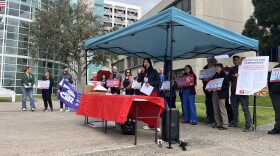SCOTT SIMON, host:
Salim Ahmed Hamdan has been on trial at Guantanamo this week. He was once Osama bin Laden's driver. He has been charged with conspiracy and providing material support for terrorism. His trial has been described as the first war crimes trial since World War II at Nuremberg. But the war and trials of 1945 are not the same as 2008. In addition, it has taken three Supreme Court decisions to determine how these trials would proceed.
Andrew McBride wrote amicus briefs for the U.S. Supreme Court in support of the government. He's a former Justice Department official and federal prosecutor who handled military and national security matters for the Department of Justice in the first Bush administration. Andrew McBride joins us in the studio. Thanks so much for coming in.
Mr. ANDREW MCBRIDE (Former Assistant U.S. Attorney): Great to be here, Scott. Thank you.
SIMON: Two terms have been out there this week, war crimes and enemy combatants. Explain them in terms of the context of Guantanamo in this week's trial.
Mr. MCBRIDE: Well, war crimes are violations of either treaty or what is known as customary international law. A classic violation of the laws of war would be waving the white flag and then picking up your guns and shooting. And the idea goes back hundreds of years that war, to be just, has to be prosecuted in a certain way. In this particular case, the conspiracy charges against Mr. Hamdan arise from two violations of the laws of war, really. One is conducting military operations out of uniform, and the other is targeting civilians directly. And that's exactly what al-Qaeda did.
Now, Mr. Hamdan is not charged in any way with participating directly in 9/11, but with aiding the conspiracy by being the driver to Osama bin Laden, by driving weapons around to various locations. And so in the law of conspiracy, someone can aid the conspiracy - be a cog, if you will, in the machine - without being involved in all the other parts of the conspiracy.
SIMON: Let me ask you about another case that's brought some attention. Omar Khadr, a Canadian, who's charged with throwing a grenade at U.S. soldiers in Afghanistan. He was 15 at the time. Now, how was that a war crime?
Mr. MCBRIDE: Throwing a grenade at the enemy in and of itself is an act of war, you know, not a war crime. I think this administration has taken the position that if you are an adherent of al-Qaeda, and then you act on behalf of al-Qaeda against the forces of the United States, you are an enemy combatant, and that is a violation of the laws of war.
Because al-Qaeda itself was an organization dedicated to the violation of laws of war. I mean, al-Qaeda's purpose is to attack civilians - it is an irregular army in that sense - which is what leads to all the questions, I think, the difficult questions, about many of the individuals detained in Afghanistan. Are they rug merchants, or were they central to al-Qaeda's operations in Afghanistan?
SIMON: There was a man who died this week, Dinko Sakic, in Croatia. He'd been convicted of war crimes because he ran a concentration camp in Croatia, carried out the torture and slaying for inmates. I think people understand, yeah, those are war crimes. Do you have any concern that by using this broad definition of war crime, it's going to diminish the concept of what a real war crime is?
Mr. MCBRIDE: I think at some point, there is a danger there that - but for Salim Hamdan, I think, it's proper to charge him. And the evidence will tell us whether he is guilty of a true war crime, whether he was knowledgeable and involved and was not just a driver, but a bodyguard and a confidant and an aide-de-camp. So I don't think on its face, the indictment or the charges against Hamdan tell us that the government is stretching too far. Let's see what the evidence says.
SIMON: Now, this kind of warfare, to your mind, makes it difficult to draw some of these distinctions effectively?
Mr. MCBRIDE: It's not a war where there's a nation state on the other side who will capitulate and will sign a treaty of peace. You know, there's not going to be any Versailles Treaty, there's not going to be any Treaty of Paris. And so how long can these individuals be held?
SIMON: Would it have undercut the government's legal case if they'd been treated as POWs in any way?
Mr. MCBRIDE: I think it might have strengthened the government's case because, you know, there were 400,000 POWs held in the United States at one time or another during World War II, Italian and German troops. None of them had judicial rights. But of course, the difference between a POW and an enemy combatant is the enemy combatant is suspected of some violation of the laws of war. The POW is simply a soldier doing his or her duty.
SIMON: Yeah.
Mr. MCBRIDE: And a POW must be released upon the conclusion of the conflict. An enemy combatant could be held at the close of the conflict to face a military tribunal for violation of the laws of war.
SIMON: Andrew McBride, partner with Wiley Rein in Washington, D.C. Thanks so much.
Mr. MCBRIDE: Thank you, Scott. Transcript provided by NPR, Copyright NPR.






